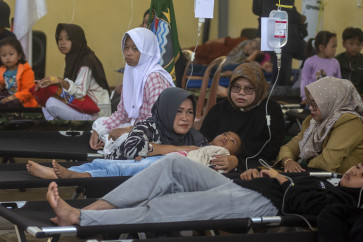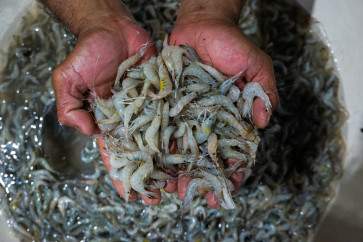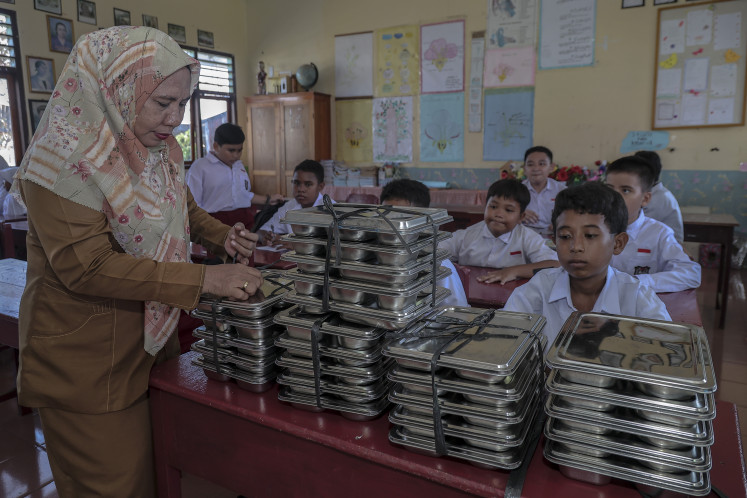Popular Reads
Top Results
Can't find what you're looking for?
View all search resultsPopular Reads
Top Results
Can't find what you're looking for?
View all search resultsSea increasingly hostile to Marunda fishermen
Fishermen in the Marunda coastal area of North Jakarta are struggling to make ends meet as they have to cope with the impact of toxic waste and climate change
Change text size
Gift Premium Articles
to Anyone
F
ishermen in the Marunda coastal area of North Jakarta are struggling to make ends meet as they have to cope with the impact of toxic waste and climate change.
The fishermen bemoan their decreasing income as they can only catch fish several times a week.
"We used to catch tens of kilograms of fish and sometimes up to one hundred kilograms at once, which was enough to sustain our needs and earn a decent income. But now, we can no longer catch this amount of fish," said Tiarom, a 33-year-old fisherman from Marunda Kepu village.
Nowadays, the fishermen can only catch several kilograms of fish a day.
"We are lucky enough to make between Rp 20,000 to Rp 50,000, but we still have to spend more to buy diesel fuel. We used to be able to earn Rp 150,000 per day," he said.
The rise of the sea water level has also caused floods in the fishermen's housing areas. They said there were never any floods there before, but now their houses could be inundated up to 50 centimeters deep when the floods came.
Tiarom said he and another 600 other fishermen in the village had less areas to catch fish, as most of the area were polluted.
They used to sail 20 to 30 kilometers away from the coastline, but now they can only go out five kilometers.
"There are more and more threatening high waves nowadays, and we are more at risk from the pollution," said Tiarom, who has been fishing since he was 10 years old.
The fishermen also used to collect shells for extra income when the weather was bad, sometimes up to a boat full of shells of various shapes.
"But now, it is also hard to collect shells because of the polluted waters," said Lemin, another fisherman in the village.
The fishermen blame the decrease in fish and shell population on the rise of development projects along the Jakarta Bay, including in Marunda.
"We are often smell something pungent at night. In the morning, we find dead fish floating along the coast," Lemin said.
"It is usually harder for us to find fish several days after the incident. Fishing conditions will only get better after two or three weeks," he added.
The fishermen have filed complaints about the pollution along the coastal area to the government, House of Representative members and also a number of politicians who have campaigned at the fishermen's village.
"We have visited the North Jakarta mayor's office three times and the city council twice. We also visited the Fishery and Maritime Ministry's office," said Lemin.
However, no real actions were taken to help them solve the problem, they said. Waste still flows to their area, killing the fish.
"But what else can we do beside protest until they *the government* does something?" Lemin said.
He expected the government to draft a law regulating how industries process their waste before disposing it in river canals.
"We just want *powerful people' to comply with the regulation and be punished if they violate it, so they will not do it again."
Lemin, Tiarom and some 60,000 fishermen in the Jakarta Bay hope the government will restore the bay to its original state and preserve it for the sake of their livelihoods.
"Being fishermen is the only thing we can do to make a living and we hope we can always count on it," Lemin said.
Secretary general of the People's Coalition for Equal Fisheries (Kiara) Riza Damanik said climate change had seriously threatened the livelihood and lives of fishermen, as a significant number of fishermen perished in tidal waves.
The UN estimated as many as 24,000 fishermen around the world died at sea last year, he said.
"This is a surprising high number. Climate change is a real threat to the fishermen and their families because their livelihoods depend on marine resources."
"During the last three months, 46 Indonesian fishermen died at sea because they could not fight tidal waves."
He said millions of fishermen often faced a dilemma when deciding whether to go fishing or not, encountering either high tides or the prospect of not being able to feed their families.
"And many of them eventually go fishing and die out in the sea."
He cited the story of a fisherman in Banten province who died fishing in January, while attempting to earn enough money to pay for his children's school fees.
"The sea is not as welcoming as it used to be, as the environment suffers more and more degradation."
The high tide period runs longer than usual, he said.
"The high tides should have ended in February, but they are still here now."
While the impact of climate change keeps getting worse, no one can assure the fishermen's safety.
"Now it is urgent for the state to protect our fishermen's rights. Every fisherman should be entitled to a safety and health insurance because of the danger he faces," Riza said.
"Who will take care of their families once they fall victim to the impact of climate change? The government should set up a special scheme to deal with this issue."
Fishermen are also at the mercy of climate change as they lack information about the latest weather forecasts, he added.
Therefore, Kiara also urged the government to provide more weather forecasts the fishermen could easily access.
"Although the government has provided weather forecasts, most fishermen still don't know where and when they are allowed to catch fish. This means fishermen's information rights have been neglected," Riza said.
Beside the impact of climate change, the rampant disposal of industrial waste also threatened the livelihood of fishermen, as it reduced their potential catch, he said.
"The world's major mining companies contribute a large amount of the 3,400 tons of waste disposed into the Indonesian ocean every day."
He said if this problem persisted, the country's potential fishery might further decrease.
"Indonesia may face a shortage crisis of marine products by 2015."










